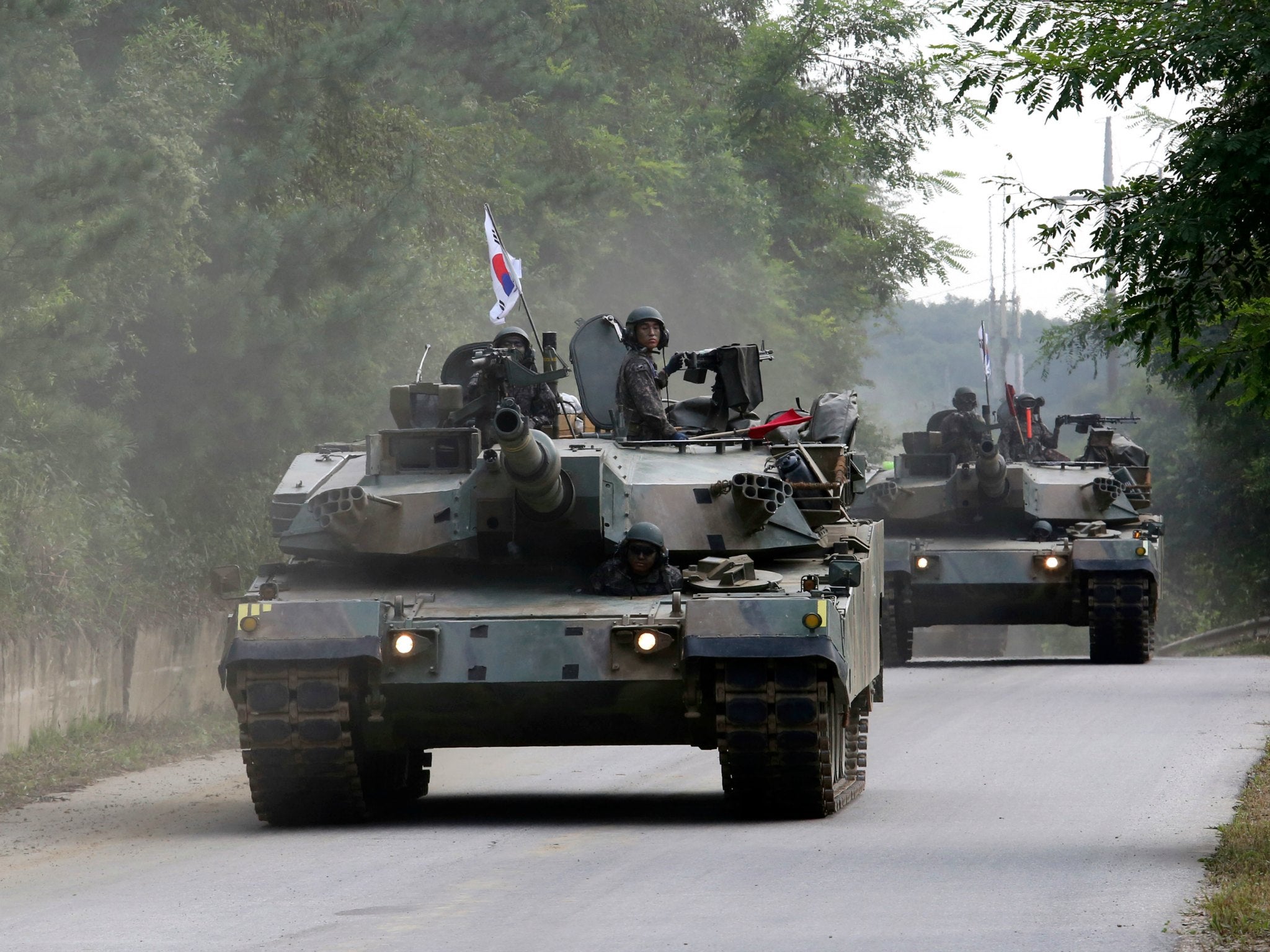South Korea hardens military resolve in face of nuclear threat from Kim Jong-un's North Korea
South Korea faces choice to move away from President Moon Jae-in's policy of engagement with North Korea

Your support helps us to tell the story
From reproductive rights to climate change to Big Tech, The Independent is on the ground when the story is developing. Whether it's investigating the financials of Elon Musk's pro-Trump PAC or producing our latest documentary, 'The A Word', which shines a light on the American women fighting for reproductive rights, we know how important it is to parse out the facts from the messaging.
At such a critical moment in US history, we need reporters on the ground. Your donation allows us to keep sending journalists to speak to both sides of the story.
The Independent is trusted by Americans across the entire political spectrum. And unlike many other quality news outlets, we choose not to lock Americans out of our reporting and analysis with paywalls. We believe quality journalism should be available to everyone, paid for by those who can afford it.
Your support makes all the difference.South Korea’s liberal President Moon Jae-in faces intensifying pressure from his own military leaders and some within his ruling Democratic Party to forget about reconciliation with North Korea and stick to a policy of no dialogue and no compromise.
Mr Moon, rounding up international support against North Korea, said he would tolerate “no advances in nuclear technology” in response to the North’s sixth nuclear test, by far its most powerful, over the weekend.
While running for president in May, after the ousting of his conservative predecessor Park Geun-hye, Mr Moon had promised to pursue a different strategy of engagement with the North and its leader Kim Jong-un, but that rhetoric has taken a back seat to the pragmatism of his Defence Ministry.
South Korea’s Defence Minister, Song Young-moo, said bluntly that the country's leadership is leaning in “a direction that strengthens the military standoff, rather than ... dialogue.”
While Mr Moon’s government is not endorsing a preemptive strike against the North’s nuclear and missile facilities, South Korea’s military command staged an exercise Monday that showed the aggressive response that commanders want. South Korean warplanes bombed and strafed imaginary targets in the East Sea, also known as the Sea of Japan., that the Defence Ministry described as simulating an attack on North Koreas leader Kim Jong-un. The Americans have set the precedent for such exercises, mounting war games described as practice for “decapitating” Kim Jong-un.
Mr Moon and US President Donald Trump agreed in a telephone call to scrap a warhead weight limit on South Korea's missiles, South Korea's presidential office said, enabling it to strike North Korea with greater force in the event of a military conflict. That call came about 30 hours after the North Korea's nuclear test and about 24 hours after Mr Trump tweeted his disdain for Mr Moon's "talk of appeasement" over his want to engage with the North. Ties have also been strained by the fact that reports emerged just ahead of Pyongyang's latest missile test that Mr Trump was mulling pulling out of a trade deal with Seoul. Doing damage control ahead of the call by Mr Trump the US National Security Council affirmed its policies regarding North Korea had not changed and the US and South Korea were working closely.
Mr Trump and Mr Moon also agreed to push for tougher punishments against Pyongyang, including tough sanctions via the UN for breaking resolutions against North Korean nuclear and missile programmes. In a statement, the White House said Mr Trump had also given his "conceptual approval" to the sale of "many billions of dollars" worth of military equipment to South Korea.
The South Korean President also spoke on the phone with Japan’s Prime Minister Shinzo Abe, while Mr Trump spoke with German Chancellor Angela Merkel with them also agreeing to push for harder sanctions.
In addition to the drill, South Korea will cooperate with the United States and seek to deploy “strategic assets like aircraft carriers and strategic bombers”, Jang Kyoung-soo, acting deputy minister of national defence policy, told a parliament hearing.
South Korea's Defence Ministry also said it would deploy the four remaining launchers of a new US missile defence system after the completion of an environmental assessment by the government.
The rollout of the controversial Terminal High Altitude Area Defence (THAAD) system at a site south of the South Korean capital, Seoul, which is vehemently opposed by neighbouring China and Russia, had been delayed since June.
South Korean defence officials warned that North Korea might well test-fire another missile, possibly a long-range intercontinental ballistic missile (ICBM), to mark the anniversary on Saturday of the formal founding of the North Korean government in 1948.
Mr Moon, however, is working hard to round up international sympathy as a prelude to persuading Mr Kim to think in terms of peace, not war. He sees Russian President Vladimir Putin in Vladivostok on Wednesday on the sidelines of an economic summit in hopes of enlisting meaningful Russian support, possibly in the form of cutting off exports of natural gas to North Korea..
South Koreas foreign minister, Kang Khung-wha was also busy, talking on the phone to the foreign ministers of Japan and China and to US Secretary of State Rex Tillerson. Dealings with China were especially sensitive since Mr Moon, contrary to his position while running for president, now favours keeping the THAAD on South Korean soil despite the strenuous objections from China.
The phone conversation between Ms Kang and China’s foreign minister Wang Yi aeared to have been strained. South Korea’s Foreign Ministry said blandly they focused on “the circumstantial assessment of the sixth nuclear test and the direction of their future response.”
Join our commenting forum
Join thought-provoking conversations, follow other Independent readers and see their replies
Comments